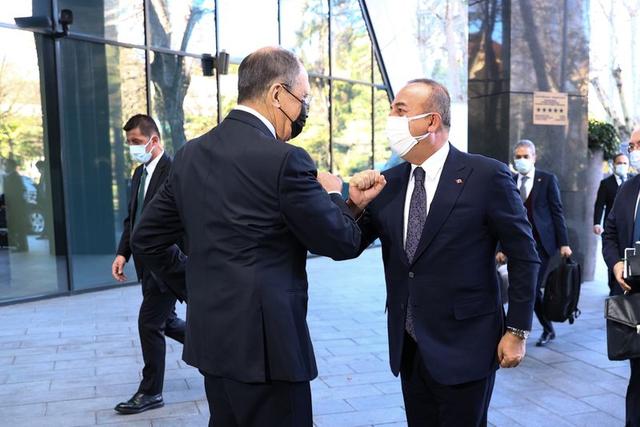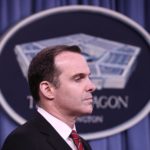Mevlut Cavusoglu, right, and Sergey Lavrov meet in Sochi, Dec. 29, 2020. (Reuters)
In recent years, Ankara and Moscow have intensified their diplomacy, with the two ambitious countries riding out the storms in their complicated relationship through cooperation in multiple areas. Their cooperation relies on a very delicate balance in three key hotspots: Syria, Libya and Nagorno-Karabakh.
Syria and Libya can be considered as long-running power struggles within the war-torn countries themselves, but also part of a wider geopolitical dispute. However, Nagorno-Karabakh, which was a frozen conflict for many years, entered as a new issue on the list of Turkish-Russian fragile relationships late last year.
On Dec. 29, Turkish Foreign Minister Mevlut Cavusoglu paid a visit to Sochi, where he held talks with his Russian counterpart, Sergey Lavrov, on the occasion of the eighth meeting of the Turkey-Russia Joint Strategic Planning Group. “We will evaluate all the dimensions of our bilateral relations. We have cooperation with Russia although we have differences in the regional issues,” Cavusoglu said ahead of the meeting.
While he mentioned that Ankara and Moscow were in different camps in Syria, he added that their cooperation under the Astana process continued through the constitutional committee meetings. He also said that Syria would not be the sole topic on the table, but also Libya and Nagorno-Karabakh. With this meeting, the two foreign ministers prepared the ground for the next Turkish-Russian High-Level Cooperation Council presidential summit between Recep Tayyip Erdogan and Vladimir Putin.
The two countries have, most importantly, agreed to carry out a comprehensive review of their bilateral relationship and regional cooperation in the Syrian, Libyan and Nagorno-Karabakh theaters, and to plan their 2021-2022 diplomatic consultations.
Although a solution has been reached in Nagorno-Karabakh, it is quite clear that Ankara and Moscow are far from being on the same side. They were at odds during the six-week war between Armenia and Azerbaijan that centered on the disputed region. The Cavusoglu-Lavrov meeting came at a time when the two countries had finalized their efforts to establish a joint center for monitoring and inspecting the implementation of the Azerbaijan-Armenia agreement. Currently, Turkey and Russia are jointly monitoring the delicate cease-fire. Ankara has already dispatched the first batch of its troops to be stationed at the center of Agdam province in Azerbaijan.
Nagorno-Karabakh is not the only hotspot where Turkish and Russian forces take part in joint patrols. They are also carrying out a joint patrolling mission in Syria’s Idlib province, along the strategic M4 highway. Since Turkey and Russia reached a deal on Idlib in 2018, in which acts of aggression were prohibited, there have been more than 1,300 civilians killed in the de-escalation zone. Although the two countries backed opposing sides in the Syrian war, they once again agreed last March to halt military activity in the northwestern Idlib region after an escalation of violence brought the two sides close to confrontation. As part of the deal, their forces have been carrying out joint patrols along the east-west M4 highway, establishing a security corridor on either side.
Turkey’s foreign policy in Libya also has a Russian dimension. As in Syria, Russia and Turkey are cooperating on the one hand while supporting opposite sides on the other. While Ankara threw its support behind the UN-backed Government of National Accord (GNA) against Khalifa Haftar’s forces, Moscow supported the latter with the mercenaries of the Wagner Group. A new chessboard has emerged in the country after the GNA’s forces took back several cities in the west of the country. The situation in Libya is as hopeless as the one in Syria, since no light is yet to be seen at the end of the tunnel.
Ankara and Moscow have managed to develop an effective modus operandi, which has contributed to each party’s regional ambitions.
Sinem Cengiz
However, these three theaters are not the only areas where Turkish and Russian interests clash. The other fishbone in the relationship is Crimea. Two days after reaffirming ties with Moscow, Cavusoglu said that the Turkish position regarding the non-recognition of Russian sovereignty over the Crimean Peninsula has not changed. This is not a new statement. Moscow is aware of Ankara’s position on Crimea and continues to reaffirm its own stance. Russian presidential spokesman Dmitry Peskov even acknowledged that Crimea is “one big difference” in the relationship between Moscow and Ankara.
The bilateral ties between Ankara and Moscow make an exceptional case study for international relations scholars. They make for a good example of a complicated interaction between two states that have faced their own sets of difficulties, in which they are treading a thin line of international diplomacy.
Needless to say, Russia and Turkey have managed to develop an effective modus operandi, which has contributed to each party’s regional ambitions and natural interests. While it is likely that the ongoing cooperation in Libya and Syria will continue, there is always the risk that new regional and international challenges will test the Turkish-Russian relations. Eyes should be fixed on the developments in the US and the eastern Mediterranean, as well as the Kurdish issue, in order to read how Ankara and Moscow will navigate the storms of any new challenges.
By: Sinem Cengiz is a Turkish political analyst who specializes in Turkey’s relations with the Middle East. Twitter: @SinemCngz
Source: Arab News



